Small overlap front: driver-side
Rating applies to 2019-25 models
Tested vehicle: 2019 Chevrolet Silverado 1500 LT Crew Cab 2wd
The Chevrolet Silverado 1500 and GMC Sierra 1500 Crew Cab were redesigned for the 2019 model year.
| Evaluation criteria | Rating |
|---|---|
| Structure and safety cage | |
| Driver injury measures | |
| Head/neck | |
| Chest | |
| Hip/thigh | |
| Lower leg/foot | |
| Driver restraints and dummy kinematics | |
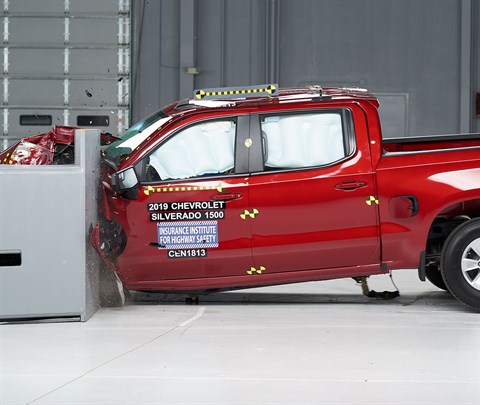
Action shot taken during the driver-side small overlap frontal crash test.

The dummy's position in relation to the door frame, steering wheel, and instrument panel after the crash test indicates that the driver's survival space was maintained reasonably well.
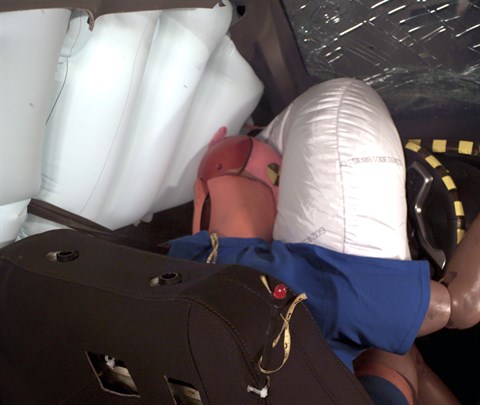
The frontal and side curtain airbags worked well together to keep the head from coming close to any stiff structure or outside objects that could cause injury.
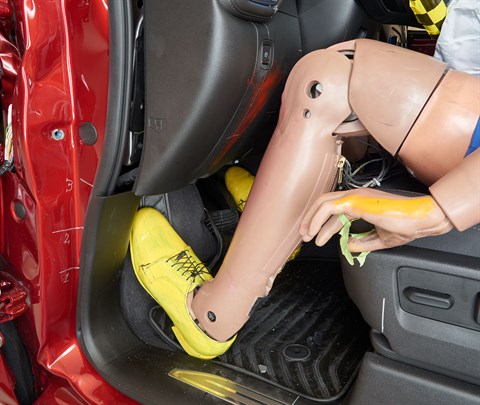
Intrusion of the toepan contributed to a moderate risk of injuries to the left foot and right lower leg.
Small overlap front: passenger-side
Rating applies to 2019-25 models
Tested vehicle: 2019 Chevrolet Silverado 1500 LT Crew Cab 2wd
The Chevrolet Silverado 1500 and GMC Sierra 1500 Crew Cab was redesigned for the 2019 model year.
| Evaluation criteria | Rating |
|---|---|
| Overall evaluation | |
| Structure and safety cage | |
| Passenger injury measures | |
| Head/neck | |
| Chest | |
| Hip/thigh | |
| Lower leg/foot | |
| Passenger restraints and dummy kinematics | |
| Driver injury measures | |
| Head/neck | |
| Chest | |
| Hip/thigh | |
| Lower leg/foot | |
| Driver restraints and dummy kinematics | |
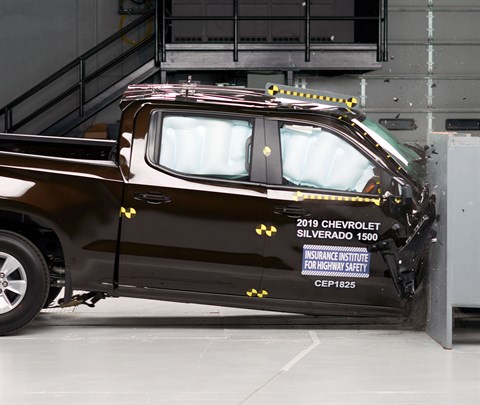
Action shot taken during the passenger-side small overlap frontal crash test.
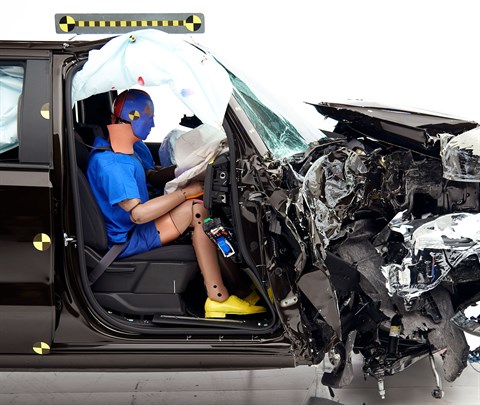
The dummy's position in relation to the door frame and dashboard after the crash test indicates that the passenger's survival space was not maintained well.
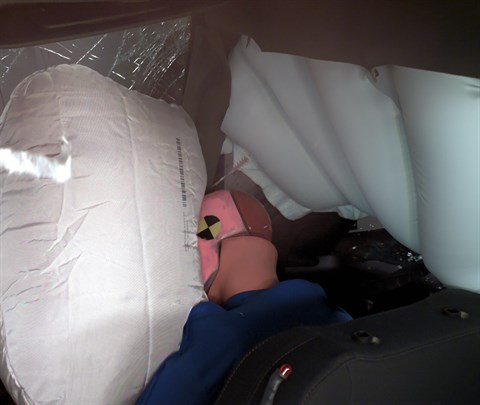
The frontal and side curtain airbags worked well together to keep the passenger dummy’s head from coming close to any stiff structure or outside objects that could cause injury.
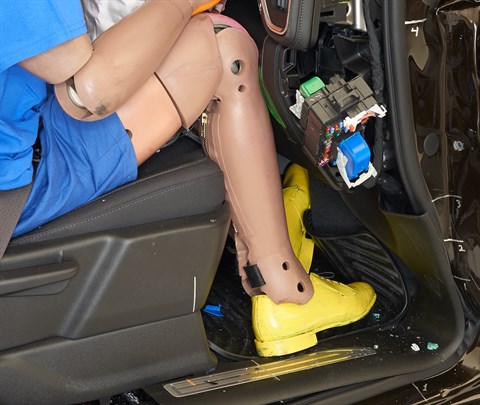
Extensive intrusion of the dashboard, toepan, and door hinge pillar contributed to a significant risk of injury to the right lower leg and a moderate risk to the left lower leg.
Moderate overlap front: original test
Rating applies to 2019-25 models
Tested vehicle: 2019 Chevrolet Silverado 1500 LT Crew Cab 2wd
The Chevrolet Silverado 1500 and GMC Sierra 1500 Crew Cab were redesigned for the 2019 model year. Moderate overlap frontal ratings are assigned by the Institute based on a test conducted by General Motors.
| Evaluation criteria | Rating |
|---|---|
| Overall evaluation | |
| Structure and safety cage | |
| Driver injury measures | |
| Head/neck | |
| Chest | |
| Leg/foot, left | |
| Leg/foot, right | |
| Driver restraints and dummy kinematics | |
Side: original test
Rating applies to 2019-25 models
Tested vehicle: 2019 Chevrolet Silverado 1500 LT Crew Cab 2wd
The Chevrolet Silverado 1500 and GMC Sierra 1500 Crew Cab were redesigned for the 2019 model year. Side ratings are assigned by the Institute based on a test conducted by General Motors.
| Evaluation criteria | Rating |
|---|---|
| Overall evaluation | |
| Structure and safety cage | |
| Driver injury measures | |
| Head/neck | |
| Torso | |
| Pelvis/leg | |
| Driver head protection | |
| Rear passenger injury measures | |
| Head/neck | |
| Torso | |
| Pelvis/leg | |
| Rear passenger head protection | |
Side: updated test
Rating applies to 2019-25 models
Tested vehicle: 2023 Chevrolet Silverado 1500 LT Crew Cab 4wd
The Chevrolet Silverado 1500 and GMC Sierra 1500 Crew Cab were redesigned for the 2019 model year. Two tests of the Silverado were conducted because the rear passenger data acquisition system failed during the first test. Driver dummy injuries, rear dummy restraints and kinematics and structural ratings are based on both tests. The rear dummy injury values are based only on the second test.
| Evaluation criteria | Rating |
|---|---|
| Overall evaluation | |
| Structure and safety cage | |
| Driver injury measures | |
| Head/neck | |
| Torso | |
| Pelvis | |
| Driver head protection | |
| Rear passenger injury measures | |
| Head/neck | |
| Torso | |
| Pelvis | |
| Rear passenger head protection | |
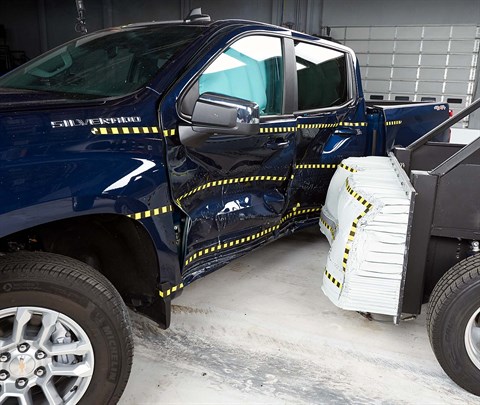
View of the vehicle just after the crash test.
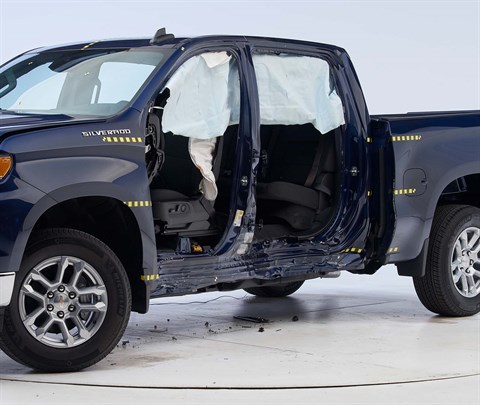
View of the vehicle after the crash with doors removed, showing the side airbags and damage to the occupant compartment.
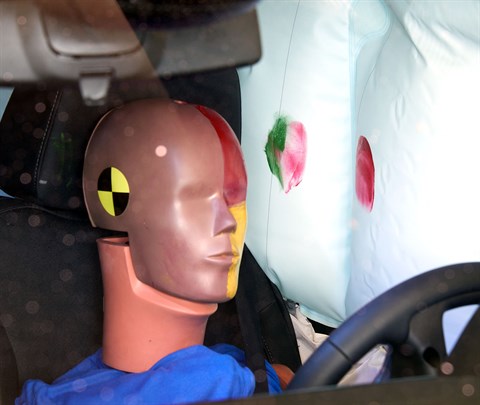
Smeared greasepaint shows where the driver dummy's head was protected from being hit by hard structures by the side airbags.
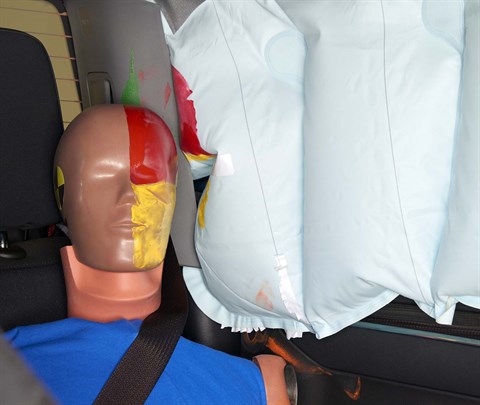
Smeared greasepaint shows where the rear passenger dummy’s head was protected by the side airbag. The C-pillar trim became completely dislodged during the crash.
Roof strength
Rating applies to 2019-23 models
Tested vehicle: 2019 Chevrolet Silverado 1500 LTZ Crew Cab 2wd
| Overall evaluation | |
|---|---|
| Curb weight | 4,818 lbs |
| Peak force | 22,236 lbs |
| Strength-to-weight ratio | 4.62 |
Head restraints & seats
Seat type: Power leather seat
| Overall evaluation | |
|---|---|
| Dynamic rating | |
| Seat/head restraint geometry |
About the head restraint & seat test
Currently, IIHS tests apply only to front seats.
Front crash prevention: pedestrian (day)
Front crash prevention: pedestrian (night)
Seat belt reminders
Rating applies to 2023 models
| Evaluation criteria | Rating |
|---|---|
| Overall evaluation | |
| Front row | |
| Unbelted occupant alert (audible & visual) | |
| Initiation time | |
| Duration | Long enough (90+ seconds) |
| Volume | |
| Audio frequency | |
| Second row | |
| Startup status alert (visual) | None |
Child seat anchors
Rating applies to 2019-25 models
| Evaluation criteria | Rating |
|---|---|
| Overall evaluation | |
| Vehicle trim | Denali |
| Seat type | leather |
This vehicle has 2 rear seating positions with complete child seat attachment (LATCH) hardware.
It has 1 additional seating position with a tether anchor only.
| Evaluation criteria | Rating |
|---|---|
| Overall evaluation | |
| Vehicle trim | Denali |
| Seat type | leather |
| Rating icon | Rating |
|---|---|
| G | Good |
| A | Acceptable |
| M | Marginal |
| P | Poor |
| Seating positions that rely on borrowed lower anchors or have only a tether anchor available are not rated. | |
thether anchor symbol | Tether anchor |
lower anchor symbol | Lower anchors |
| Lower anchor(s) can be borrowed from adjacent positions(s) | |
| No hardware available |
Details by seating position
| Position | Rating |
|---|---|
| 1 | |
| Tether anchor | |
| hard-to-find location | |
| other hardware could be confused for anchor | |
| Lower anchors | |
| too deep in seat | |
| not too much force needed to attach | |
| easy to maneuver around anchors | |
| 2 | |
| Tether anchor | |
| hard-to-find location | |
| other hardware could be confused for anchor | |
| Lower anchors | |
| none available | |
| 3 | |
| Tether anchor | |
| hard-to-find location | |
| other hardware could be confused for anchor | |
| Lower anchors | |
| too deep in seat | |
| not too much force needed to attach | |
| easy to maneuver around anchors |
